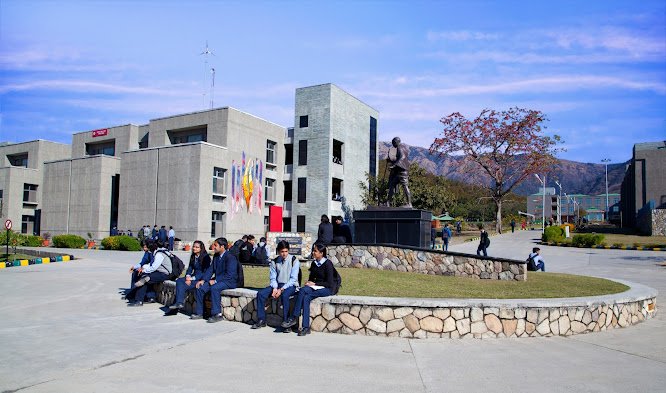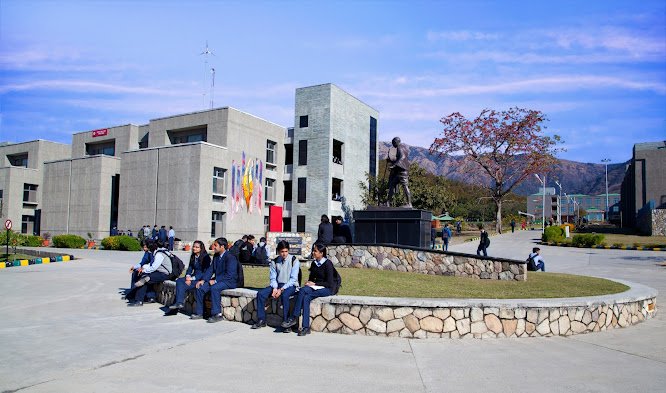.jpg)
Importance of Technical Education and Language Skills:
Bangladesh can be an emerging tiger of South Asia if the government and policymakers take pragmatic initiatives regarding the future education of the vast population of the country. The huge population means huge human resources, which can be a blessing, not a burden, for our small country if we can add the adjective ” skilled” to this phrase “human resources.” Technical and vocational training and language skills can be a game-changer for the future economy of Bangladesh.
Education is a very important word since the word itself is very dynamic, and has a transforming impact on our lives. But the government and our policymakers are supposed to be very indifferent to this word. As a conscious citizen of my country, I have a right to focus on this issue. If we look at our education system, especially I am talking about the government-affiliated education system, we hardly see any remarkable progress or change in it. So far, we have scarcely noticed any dynamism in our education system. Education is called the backbone of a nation, but our education system may be stuck somewhere for this or that reason, as if we are opting for someone to come and raise our education system from a ditch, but nobody comes.
Technical Education and Economic Growth
Industrial and service sectors demand technical skills:
Bangladesh’s economy relies heavily on manufacturing (e.g., textiles, garments, furniture) and a fast-growing IT/BPO sector. All require trained workers. Technical and vocational education and training (TVET) can increase employment and output. For instance, the ADB-backed Skills for Employment Investment Program (SEIP), which provides training in garments, ICT, construction, and other sectors, has enrolled 784,908 youth and workers by mid-2025.
Of these, 685,235 have completed training and 484,538 have found jobs, roughly 62% of enrollees. This suggests substantial labor-market absorption from targeted training. Likewise, the World Bank-supported ASSET project aims to train over 1 million young people in “essential skills for the future”, focusing on technical trades and inclusion.
Skills boost productivity and competitiveness:
Well-trained workers tend to be more productive. On the other hand, lack of skill reduces output: one sector study notes that Bangladesh’s low average labor productivity (10.4%) – far below South Asia’s 16.3% – reflects “the existing skill gap and shortage of skilled manpower. The same study notes that Bangladesh’s wage advantage is very low due to this productivity deficit. Indeed, skill shortage can directly reduce per-worker productivity and business profitability. Government targets and policies explicitly aim to raise productivity through skills. Moreover, private sector surveys show nearly half of employers (46%) struggle to find applicants with needed skills, indicating untapped human capital that better training could unlock.
Gender Impartiality:

Skill initiatives increasingly emphasize inclusion. Bangladesh’s TVET coverage and media highlight that women and marginalized groups have lower access to training. For example, only 18% of teaching posts in technical colleges are filled, impacting all students. Experts at a recent conference noted women often excel at skills once trained, but face societal barriers to employment. Initiative programs now target “Leave No One Behind” communities with outreach and reserved quotas. Expanding training for women and disabled persons not only promotes equity but also enlarges the skilled labor force.
Language Skills and Global Integration
English proficiency for the global market:
Bangladesh’s participation in global value chains and service outsourcing depends heavily on English. Employers consistently rate English as “crucial for hiring” in the corporate, IT, and hospitality sectors. Bangladesh’s EF English Proficiency Index score has improved to 500 (moderate proficiency), placing it 61st of 116 countries. Nevertheless, many graduates still lack fluency. Surveys find poor English communication to be a common hiring barrier. For example, Bangladesh scored only 467 (low proficiency) on EF’s 2020. This gap limits access to higher-paying foreign or export-oriented jobs. In response, both the Ministry of Education and private institutions emphasize English education. Programs like UNICEF/GenU’s new curriculum framework explicitly integrate English and digital literacy into secondary education to meet private sector demand.
Languages for migration and trade:
Besides English, Bangladeshis migrate to the Middle East in large numbers for work. “Basic Arabic communication skills can significantly improve migrant workers’ job prospects and earnings,” yet formal Arabic training is scarce. Government training centers (e.g., under the Department of Youth and BMET) now offer small Arabic and English literacy courses, but these reach only dozens per year. Language training for foreign markets is an underdeveloped niche: most migrants receive little preparation. Improving this (e.g., at BMET technical training centers for overseas workers) could raise remittance income and safety.
Soft skills and communication.
Employers also highlight communication, teamwork, and problem-solving as top unmet needs. Recent surveys report that 80–90% of employers value communication and problem-solving highly, yet many young workers admit to lacking these skills. Technical programs increasingly include modules on interpersonal and language skills to address this gap. Overall, bolstering both technical know-how and language/soft skills is seen as crucial to make Bangladesh’s workforce more employable and competitive globally.
Public-Private Partnerships:
The government should increasingly involve industry in training. Sector Skills Councils (e.g., for ICT, RMG, agriculture) have been created to advise on curriculum and ensure that training content matches employer needs. For instance, the Bangladesh Apparel Youth Leaders Association should advocate for garment-sector soft skills. Some large firms sponsor or certify training. Employers like Bkash Ltd. fund coding and English classes for disadvantaged youth. Such collaborations aim to make training more market-driven.
International Cooperation:
Development partners have invested heavily in Bangladesh’s skills push. The ILO (with EU funding) has supported TVET reform and labor market studies. The Financial Express reports that the ILO, the EU, and Canada have provided funding and technical expertise alongside government efforts. The ILO Skills Global Forum (2024) highlighted Bangladesh’s progress and called for lifelong learning strategies. ADB, World Bank, JICA, GIZ, and other agencies continuously finance vocational centers, scholarships, and policy support. This support is explicitly acknowledged by officials: at an ILO forum in 2024, Bangladesh’s delegation noted “the government has multiplied its investment in TVET and skills development” since 2007 and credited partners with accelerating
Government and Policy Initiatives
Contribution of NU in Bangladesh:
The National University produces nearly one million graduates each year and accounts for 70 % of higher education. From law colleges and BEd institutions to physical education and music colleges in Dhaka, and including all other colleges across the country- Police Science College, BKSP, PIB- our programmes are running everywhere.
The contribution of NU to Bangladesh’s higher education landscape can’t be overstated. Our graduates mostly go into the private sector, with a smaller portion entering the public sector, such as the BCS. Last year, NU ranked third in the Public Service Commission results.
The government has launched multiple policies and programs to strengthen skills:On 14 May 2025, I encountered an exclusive interview with Vice-Chancellor ASM Amanullah, which was published in the National Daily, The Business Standard. The interview was very informative and pragmatic. In that very interview, the VC of National University drew our attention to the reformation of our National University, which can be a time-honoured decision. He also expressed the government’s desire to uproot the political interference and affiliation from the University. He said that the government has already launched multiple policies and programs to strengthen the skills of the students. If these measures are taken, there will be a massive improvement and transformation in our country’s education system.
Now, I would like to share some information from the interview of the Vice Chancellor of our National University, and his reply regarding the prospects of the Technical Education and the language skills for the future development of Bangladesh.
Plan for Technical Education:
We are making it mandatory to include a technical course worth 10 to 25 credits alongside Honours and Master’s degrees. This way, students will graduate with both an academic and technical certifiate- a double degree. The ministry has accepted it. We all are working together on this.
We are focusing heavily on technical education. The education adviser, the secretary, and our technical secretary are all involved in this effort. Students can choose a technical course aligned with their interest; for example, if someone likes nature, they will work with nature; if they like outsourcing, they will work with outsourcing. We will cluster students accordingly.
We’ll start it next semester. From this semester, we are also making strong ICT skills and English mandatory. From the following semester, we’ll launch the technical trade course properly. In this regard, we have already signed MoUs with the National Skill Development Foundation (NSDF), A2i, and also with some international counterparts.
How to make students interested in Technical Education:
It’s not that students are not interested in technical education- we are the ones responsible. Those of us making policies and sitting in administrative positions have never assessed what students actually want.
Girls in remote parts of Bangladesh are freelancing and earning $2000 a month, yet we never designed any programmes targeting them. Now, we are trying to reach them with a specially designed programme, despite our limited resources. We aim to produce 5000 freelancers annually using NU’s resources.
Programmes and methods for teaching foreign languages:
In the last syndicate meeting, we obtained permission to establish a multilingual club under NU. This club will offer Korean, Spanish, English, Arabic, Japanese, and even Bangla, because some people want to learn Bangla properly.
We are setting this up in Gazipur and will gradually bring it to Dhaka at our new campus located beside the UGC. Eventually, we’ll pilot this in 250 model colleges. We’ll offer it online in places where teachers are unavailable. With this initiative, we are basically targeting industries with demands for skilled workers.
The National University covers a vast range of educational institutions. Every year, a great number of students from our country complete their graduation and post-graduation in different subjects. But these graduates of our country only add an extra burden to our unemployment problem, as we can’t provide them with suitable jobs. Though these graduates are very keen to develop their skills and their graduation degrees, there is no such provision for them. As a result, our nation is being deprived of the latent talent of these young guns who can contribute greatly to transforming the country.
Conclusion:
A huge portion of our population is youth. So, the development of a country can’t be thought of without making a considerable number of the young generation skilled. We should introduce numerous career and job-oriented subjects. We should make our young generation educated, skilled, and morally uplifted. If we can incorporate these three qualities into our education system, then we can expect a great transformation in every sphere of our country.




